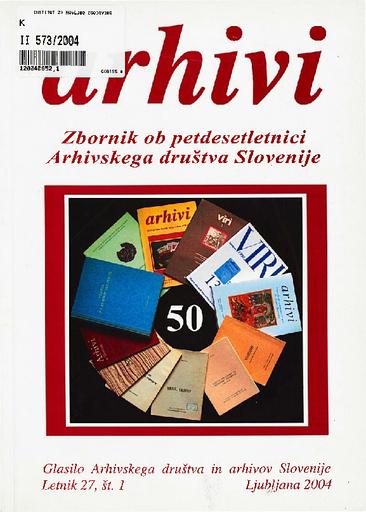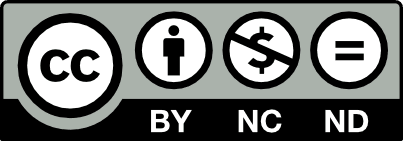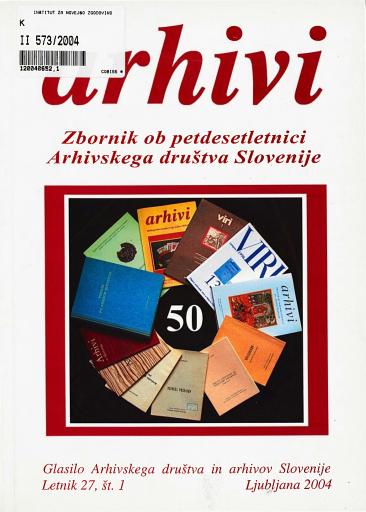/
Periodicals
/
Archives
Legal basis for the operation of societies (1849-1941)

Author(s):Ivanka Zajc Cizelj
Co-author(s):Matevž Košir (ur.)
Year:2004
Publisher(s):Arhivsko društvo Slovenije, Ljubljana
Source(s):Arhivi, 2004, št. 1
Language(s):slovenščina
Type(s) of material:text
Keywords:društvo, družba, zveza, podjetje, zavarovalnica, zborovanja, shodi, posveti, patent, zakon, odredba, statut, dovoljenje, vpisnik, society, organisation, association, enterprise, insurance company, meetings, conventions, deliberations, patent, act, regulation, statute, permission, register
Rights:

This work by Ivanka Zajc Cizelj is licensed under Creative Commons Attribution-NonCommercial-NoDerivs 4.0 International
Files (1)

Name:ARHIVI_2004-1.pdf
Size:17.91MB
Format:application/pdf
Permanent link:https://hdl.handle.net/11686/file311
Description
Political freedoms, provided to Austrian citizens by their March Constitution of 1849, included the
freedom of association and peaceful assembly, as an active part of the legal regulations framework.
The establishment and operation of societies were governed by a number of regulations: imperial
patent (1849 and 1852), which distinguished between political and non-political societies, the latter
being further divided into profit and non-profit societies, and by general act on societies, adopted in
1867 which was a turning point in the scope of the societies' functions. The societies, based on
financial acquisition (profit organisations), and those implementing important economic activities
were exempt from the general act on societies. Until the adoption of the act on profitable and
economic societies and enterprises from 1873, they were governed by the provisions of the imperial
patent from 1852. Other regulations followed which governed the functions of insurance companies
and health insurances. The state protected the public interest by ordering that every society needs to
obtain a special permission for establishment, functioning and organisation of meetings or
conventions. The permission was denied if the state believed that the planned activity was not in
accordance with the regulations or that it presents a threat to public order.
In April 1941, the societies that had been in operation for almost one hundred years were
disturbed by the government decision on the appointment of a commissioner for societies,
organisations and associations, who had the task to put into force the decree on the dissolution of all
societies, organisations and associations in Lower Styria.
Metadata (12)
- identifierhttps://hdl.handle.net/11686/9453
- title
- Pravna osnova za delovanje društev 1849-1941
- Legal basis for the operation of societies (1849-1941)
- creator
- Ivanka Zajc Cizelj
- contributor
- Matevž Košir (ur.)
- subject
- društvo
- družba
- zveza
- podjetje
- zavarovalnica
- zborovanja
- shodi
- posveti
- patent
- zakon
- odredba
- statut
- dovoljenje
- vpisnik
- society
- organisation
- association
- enterprise
- insurance company
- meetings
- conventions
- deliberations
- patent
- act
- regulation
- statute
- permission
- register
- description
- Political freedoms, provided to Austrian citizens by their March Constitution of 1849, included the freedom of association and peaceful assembly, as an active part of the legal regulations framework. The establishment and operation of societies were governed by a number of regulations: imperial patent (1849 and 1852), which distinguished between political and non-political societies, the latter being further divided into profit and non-profit societies, and by general act on societies, adopted in 1867 which was a turning point in the scope of the societies' functions. The societies, based on financial acquisition (profit organisations), and those implementing important economic activities were exempt from the general act on societies. Until the adoption of the act on profitable and economic societies and enterprises from 1873, they were governed by the provisions of the imperial patent from 1852. Other regulations followed which governed the functions of insurance companies and health insurances. The state protected the public interest by ordering that every society needs to obtain a special permission for establishment, functioning and organisation of meetings or conventions. The permission was denied if the state believed that the planned activity was not in accordance with the regulations or that it presents a threat to public order. In April 1941, the societies that had been in operation for almost one hundred years were disturbed by the government decision on the appointment of a commissioner for societies, organisations and associations, who had the task to put into force the decree on the dissolution of all societies, organisations and associations in Lower Styria.
- Med politične svoboščine, ki jih je avstrijskim državljanom zagotavljala marčna ustava iz leta 1849, je spadala tudi svoboda združevanja in zborovanja; taje bila mišljena kot dejavnost v okviru zakonskih predpisov. Ustanavljanje in delovanje društev sta bili regulirani s predpisi — cesarskim patentom (1849 in 1852; društva je delil na politična in nepolitična, ta pa še na profitna in neprofitna) ter splošnim društvenim zakonom, sprejetim leta 1867, ki je pomenil prelomnico v širini delovanja društev. Društva, ki naj bi bila pridobitna (profitna) in organizacije za uresničevanje pomembnih gospodarskih dejavnosti so bila izvzeta iz splošnega društvenega zakona in so zanje do sprejetja zakona o pridobitnih in gospodarskih društvih in družbah leta 1873 veljala določila cesarskega patenta iz leta 1852. Sledili so še drugi predpisi, ki so urejali delovanje zavarovalnic in bolniških blagajn. Javne interese je država zavarovala tako, da so vsa društva za ustavljanje in delovanje ter organizacijo zborovanj ali shodov potrebovala dovoljenje oblasti; tega niso dobila, če je oblast menila, da nameravano dejanje ni v skladu s predpisi ali bi ogrožalojavni red in mir. V skoraj sto let trajajoče delovanje društev je zelo posegla odredba o določitvi komisarja za društva, organizacije in zveze aprila 1941, katerega naloga je bila uresničiti odredbo o razpustitvi vseh društev, organizacij in zvez na Spodnjem Štajerskem.
- publisher
- Arhivsko društvo Slovenije
- date
- 2004
- type
- besedilo
- language
- Slovenščina
- isPartOf
- rights
- license: ccByNcNd
Citirano v (1)
| Tipologija | Avtor(ji) | Naslov | Kraj | Založba | Leto |
|---|---|---|---|---|---|
| 1.01 Izvirni znanstveni članek | Ličen, Daša | Zbližati, izobraziti in razvedriti slovanski živelj : članstvo Slavjanskega društva v Trstu ob pomladi narodov | Ljubljana | Zveza zgodovinskih društev Slovenije | 2022 |
